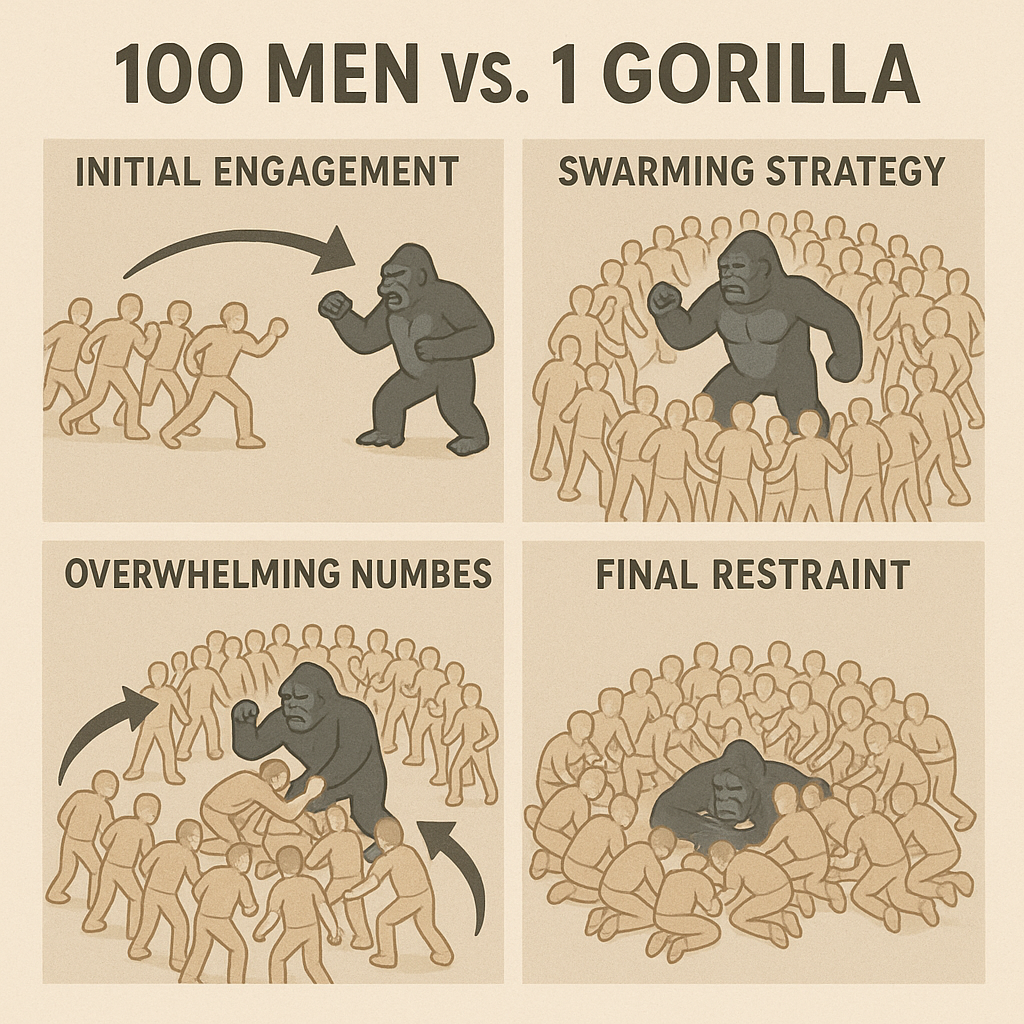100 men vs. 1 gorilla: Who would win?
In a 100 men vs. 1 gorilla scenario, the humans would almost certainly win if they coordinated and used tactics—even without weapons. Here's why:
Physical Power
-
A silverback gorilla is extremely strong—estimates suggest 6–10x stronger than an average human.
-
It has immense bite force, long arms for grappling, and is agile and fast over short distances.
However...
-
100 humans is an overwhelming number. Even unarmed, if they work together, they can swarm, distract, and restrain the gorilla.
-
The gorilla might maul several people very quickly, maybe even kill a few, but it can’t fight off 100 people coming from all directions indefinitely.
-
Humans are tool users and strategists. Even primitive coordination (some distract, some restrain) would tip the scales.
Key Variable: Human Coordination
If the humans panic or fight one-on-one, the gorilla could defeat many of them. But if they coordinate, it's no contest.
Verdict:
-
Gorilla wins against a few men.
-
100 men, if organized even minimally, win against 1 gorilla—though with casualties.

Here's a play-by-play breakdown of a hypothetical confrontation: 100 unarmed men vs. 1 silverback gorilla, assuming average strength, no weapons, and a contained space like an arena.
🧠 Assumptions:
-
The men are average civilians, not trained fighters.
-
The gorilla is healthy, fully grown (~400 lbs of muscle and aggression).
-
The humans decide to work together, not run in fear.
-
No weapons involved.
🔥 ROUND-BY-ROUND SCENARIO
Round 1: Initial Engagement (Seconds 0–15)
-
10 brave (or foolish) men rush the gorilla first.
-
The gorilla is alarmed, defensive, but quickly becomes aggressive.
-
It punches, bites, and throws 3–5 of them with ease. Some are seriously injured or killed.
-
The rest hesitate or back off.
✅ Gorilla dominant, humans take early losses.
Round 2: Swarming Strategy (Seconds 15–30)
-
A second wave of 20–30 men surrounds the gorilla from all sides.
-
Some grab limbs while others try to climb or tackle.
-
The gorilla thrashes violently—throwing bodies, biting, pounding its chest and attackers.
-
It possibly kills 5–10 more, injuring more.
-
But its mobility is reduced.
⚠️ Gorilla is still deadly, but losing ground due to sheer numbers.
Round 3: Overwhelming Numbers (Seconds 30–60)
-
Now, 50+ men are engaged or closing in.
-
Multiple attackers grapple each limb, others try to blind or distract.
-
Eventually, they pin the gorilla to the ground.
-
It keeps resisting, but muscle fatigue sets in and its effectiveness drops sharply.
✅ Gorilla overwhelmed, restrained—but with major human casualties (20–30 injured or worse).
Round 4: Final Restraint (Minutes 1–2)
-
The remaining men dogpile to immobilize the gorilla.
-
It’s still alive and dangerous, but neutralized.
-
Breathing heavily, maybe slightly injured, it can no longer attack effectively.
🏁 Victory: Humans win by swarm tactics and attrition.
📊 Casualty Estimate:
-
Gorilla: Likely survives (depending on how far the fight is taken).
-
Humans:
-
10–20 seriously injured or killed (head trauma, bites, blunt force).
-
20–30 mildly injured (bruises, sprains).
-
Remaining 50+ finish the job.
-
Want a tactical diagram showing the stages of engagement?
Sure! Here's a play-by-play breakdown of a hypothetical confrontation: 100 unarmed men vs. 1 silverback gorilla, assuming average strength, no weapons, and a contained space like an arena.
🧠 Assumptions:
-
The men are average civilians, not trained fighters.
-
The gorilla is healthy, fully grown (~400 lbs of muscle and aggression).
-
The humans decide to work together, not run in fear.
-
No weapons involved.
🔥 ROUND-BY-ROUND SCENARIO
Round 1: Initial Engagement (Seconds 0–15)
-
10 brave (or foolish) men rush the gorilla first.
-
The gorilla is alarmed, defensive, but quickly becomes aggressive.
-
It punches, bites, and throws 3–5 of them with ease. Some are seriously injured or killed.
-
The rest hesitate or back off.
✅ Gorilla dominant, humans take early losses.
Round 2: Swarming Strategy (Seconds 15–30)
-
A second wave of 20–30 men surrounds the gorilla from all sides.
-
Some grab limbs while others try to climb or tackle.
-
The gorilla thrashes violently—throwing bodies, biting, pounding its chest and attackers.
-
It possibly kills 5–10 more, injuring more.
-
But its mobility is reduced.
⚠️ Gorilla is still deadly, but losing ground due to sheer numbers.
Round 3: Overwhelming Numbers (Seconds 30–60)
-
Now, 50+ men are engaged or closing in.
-
Multiple attackers grapple each limb, others try to blind or distract.
-
Eventually, they pin the gorilla to the ground.
-
It keeps resisting, but muscle fatigue sets in and its effectiveness drops sharply.
✅ Gorilla overwhelmed, restrained—but with major human casualties (20–30 injured or worse).
Round 4: Final Restraint (Minutes 1–2)
-
The remaining men dogpile to immobilize the gorilla.
-
It’s still alive and dangerous, but neutralized.
-
Breathing heavily, maybe slightly injured, it can no longer attack effectively.
🏁 Victory: Humans win by swarm tactics and attrition.
📊 Casualty Estimate:
-
Gorilla: Likely survives (depending on how far the fight is taken).
-
Humans:
-
10–20 seriously injured or killed (head trauma, bites, blunt force).
-
20–30 mildly injured (bruises, sprains).
-
Remaining 50+ finish the job.
-
